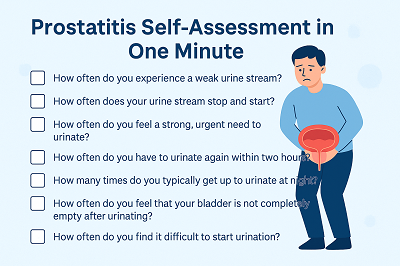Prostatitis Self-Assessment in Just One Minute — Have You Tried It Yet?
Prostatitis has become an increasingly common issue among men, with studies showing that nearly 50% of males may experience it at some point in their lives. As the incidence of prostatitis continues to rise, this "troublesome gland" is gaining more attention. But how do you know if you're affected by prostatitis?

While a doctor's diagnosis is essential, a quick self-assessment can help you identify whether you may need further evaluation. In this article, we'll walk you through a one-minute self-test for prostatitis and discuss what to do if your results raise concerns.
One-Minute Self-Test for Prostatitis
Answer the following 7 questions and rate the frequency of each symptom. Use this scale:
- Never = 0 points
- Once = 1 point
- Twice = 2 points
- Three times = 3 points
- Four times = 4 points
- Five times or more = 5 points
Questions:
- How often do you experience a weak urine stream?
- How often does your urine stream stop and start multiple times?
- How often do you feel a strong, urgent need to urinate?
- How often do you have to urinate again within two hours?
- How many times do you typically get up to urinate at night?
- How often do you feel that your bladder is not completely emptied after urination?
- How often do you find it difficult to initiate urination?
Scoring:
- 0–7 points: Mild symptoms – likely requires observation.
- 8–19 points: Moderate symptoms – evaluation and treatment recommended.
- 20–35 points: Severe symptoms – professional medical treatment strongly advised.
⚠️ Important: Even if your total score is low, a score of 3 or more on any single question should not be ignored. It may indicate a need for medical attention.
Why You Still Need a Clinical Diagnosis
While the above test is a useful reference, it does not replace medical evaluation. Doctors will typically conduct a detailed examination, which may include:
- Urine tests and cultures
- Prostatic fluid analysis
- Semen analysis (for fertility concerns)
- Ultrasound or imaging tests
- Pathogen identification for bacterial infections
What to Do If You're Diagnosed with Prostatitis?
If your doctor confirms prostatitis, there are several steps you can take to promote healing and prevent recurrence:
1. Correct Lifestyle Habits
- Avoid prolonged sitting and excessive cycling
- Do not overwork or over-exercise
- Stay warm and prevent urinary tract infections
- Maintain a balanced and regular sex life
2. Adjust Your Diet
- Spicy and irritating foods can worsen prostate congestion. Try to avoid:
- Garlic, onions, ginger
- Peppers, chives, wasabi
- Alcohol and caffeine
Instead, focus on light, nutritious meals and increase your intake of fresh vegetables and water.
3. Mind Your Mental Health
Chronic prostatitis often causes anxiety, frustration, and even depression due to its persistent symptoms.
Maintaining a positive mental attitude and emotional stability is essential for effective treatment. Psychological stress can hinder your body's immune response and slow down recovery.
4. Choose Effective Medication
For chronic prostatitis, many patients benefit from herbal remedies that support holistic healing.
One well-known TCM product is the Diuretic and Anti-inflammatory Pill, a natural formulation made from herbs such as plantain seed, polygonum, gardenia, houttuynia cordata, angelica, and others.
This formula is designed to:
- Clear heat and detoxify
- Promote blood circulation and relieve pain
- Reduce inflammation and swelling
- Improve urinary flow and dissolve prostatic calcification
- Support reproductive health and fertility
Diuretic and Anti-inflammatory Pill targets both the symptoms and the root causes of prostatitis, offering a non-invasive and side-effect-free solution, especially suitable for long-term management of chronic cases.
Final Thoughts
Early detection and intervention are key in managing prostatitis. The one-minute self-assessment offers a convenient way to reflect on your urinary and prostate health. If your symptoms persist or worsen, consult a medical professional promptly. By combining lifestyle adjustments, psychological balance, and traditional herbal treatments like the Diuretic and Anti-inflammatory Pill, you can take proactive steps toward prostate recovery and long-term wellness.



